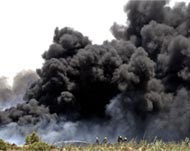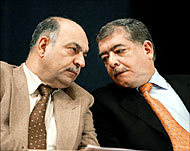Iraqi leaders reach deal on oil wealth
Iraqi leaders, under intense US pressure, have reached tentative agreements on oil wealth distribution, perhaps the most divisive issue among for the country’s ethnic and religious groups.

Panelists finalising Iraq’s constitution said on Saturday a deal had been struck to share the world’s second largest known oil reserves, which are concentrated in the Kurdish controlled north and largely Shia south.
“An in principle agreement has been reached late yesterday that Iraq’s oil revenues will be shared between the Shia, the Kurds and the Sunnis,” Sunni panelist Saleh al-Mutlaq said.
Distributed centrally
Many Sunnis fear that if Iraq adopts a federal structure, the country’s oil wealth will be divided up between the Kurdish and Shia regions, leaving them with nothing.
But Mutlaq explained that while a percentage of oil revenue would go to the federal government, the rest would be distributed centrally to each governorate according to its population size.
“All the groups have agreed on this,” said Mutlaq, one of the representatives on the 71-member constitution committee struggling to draw up a draft charter before Monday’s deadline.
Some reports indicated the federal government of each oil producing region would take a revenue share of about 5%, with the rest going to Baghdad for nationwide distribution.
Sunni agreement lacking
 |
|
Many northern pipelines are |
A Kurdish member of the panel expressed caution over interpreting the apparent consensus as an end to problems over the division of Iraq’s oil wealth.
“The Sunnis have still not agreed to any of the main points … but even if there is no agreement from them, the draft can still be passed in the National Assembly,” Kurdish National Assembly member Mahmud Othman said.
Othman said Kurdish and Shia groups could use their parliamentary majority over the Sunnis to get the charter approved by Iraq’s legislature.
While Sunnis are represented on the constitution-drafting body, their decision-making power is effectively limited since the minority group has little sway in parliament after largely boycotting January’s national elections.
US pressure
 |
|
Al-Ghadban (R) was not |
“The agreement is between the Kurdish and Shia coalitions, maybe supported by Allawi’s list,” said Othman, adding that intense pressure from the Americans had been a crucial factor. Iyad Allawi is the ex-prime minister and a powerful secular Shia coalition leader.
Crucial consensus was also reached on the future of the disputed oil-rich city of Kirkuk which sits atop 40% of the country’s oilfields, or 6% of total world reserves, a source close to the process said.
Another panelist said an agreed deadline for “normalisation of Kirkuk” had been laid out in the draft constitution – the first time such a deadline has been
officially agreed.
During the 1980s, former Iraq president Saddam Hussein tried to consolidate his control over Kirkuk’s oil by expelling thousands of Kurds from the region, replacing them with mainly Shia Arabs from the country’s south.
Kurds are demanding this process be reversed before holding a referendum on the future status of a city they want included within the borders of a federally autonomous Kurdish zone.
Kirkuk dispute
Kurdish commentators welcomed the news of a deadline for normalisation.
“We have been asking for a normalisation deadline throughout, so this is a good step,” said Noory Talabani, a Kurdish regional MP and an international expert on Kirkuk.
|
“The Sunnis have still not agreed to any of the main points” Mahmud Othman, |
“It is significant that this goes into the constitution since it represents a recognition that the situation is not normal,” Talabani said.
Iraqi oil officials were cautious about the emerging consensus.
“I have to see the overall oil formula before deciding if it will work,” said former oil minister Thamer al-Ghadban.
“There are other important factors like control of oil exploration and other ventures.”
Iraq’s output of nearly two million barrels a day largely comes from southern oilfields, while all of the 1.6 million barrels a day of exports flow through southern terminals.
Northern oil export routes remain paralysed due to the security situation.